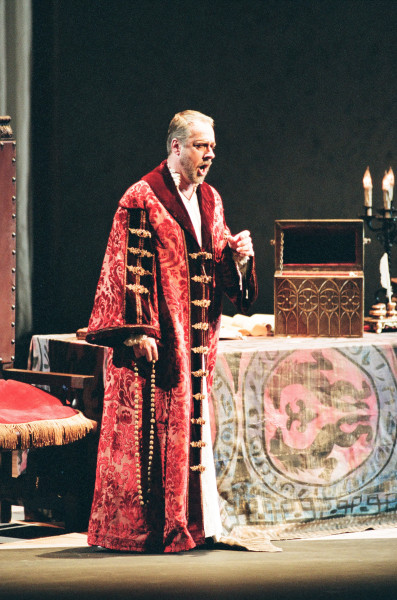Interview:Roberto Scandiuzzi on Don Pasquale
 --Mr Scandiuzzi, you are known all over the world as a Verdian bass. At the New National Theatre, Tokyo, you sang in Don Carlo in December 2001 and further appearances in Japan include Verdi's Requiem with the Tokyo Philharmonic Orchestra and La forza del Destino with the Teatro del Maggio Musicale Fiorentino on their Japan tour.
--Mr Scandiuzzi, you are known all over the world as a Verdian bass. At the New National Theatre, Tokyo, you sang in Don Carlo in December 2001 and further appearances in Japan include Verdi's Requiem with the Tokyo Philharmonic Orchestra and La forza del Destino with the Teatro del Maggio Musicale Fiorentino on their Japan tour.
Scandiuzzi(S): Verdi's bass roles suit my voice very well. For example, I have sung the role of Fiesco in Simon Boccanegra 471 times in total - and that's the ones I've counted, so in fact it may be a bit more.
--That must be a record! On the other hand, you also perform in opera buffa such as the upcoming Don Pasquale at the New National Theatre, Tokyo.
S: Buffo roles are relatively recent repertory for me. Since I was a young singer, I have always sung so-called 'basso nobile' roles, but now that I am in my 50s, I began to feel I wanted to sing more fun roles. Also, there are some roles I can now sing with ease because I've matured as an artist. The buffo role I've sung most is Don Basilio in Rossini's Il barbiere di Siviglia, but I love singing the title role in Don Pasquale too.
--How will you perform this role?
S: For Italians, this is a typically Roman story. Just as Puccini brilliantly portrayed Florence in Gianni Schicchi, and Wolf-Ferrari captured the characteristics of Venice in I quatro rusteghi, Don Pasquale reflects the life of the good old Roman bourgeoisie of the nineteenth century.
Don Pasquale is a gentleman who has made a name for himself, and he is considering marriage late in his life. He takes everything so seriously that those around him find this funny. I am a serious type of bass and not a 'basso comico'. Don Pasquale shouldn't act the fool - instead it's his seriousness that causes the laughter. In that sense, I think the role suits my voice very well.
--What attracts you most about the bel canto operas of Donizetti and Bellini?
S: Above all, the melodic beauty of these operas, which has the power to speak directly to the listeners' hearts. In fact, the Italian canzone, which was a popular genre until our generation, inherited this bel canto tradition. For example, Amina's aria "Ah! non credea mirarti" from Bellini's La sonnambula (he sings the opening) could easily be transformed into a popular canzone. The melody, which utilizes legato, is used for the expression of the text. Good taste and delicateness are the characteristics of bel canto opera.
--Of Donizetti's numerous opera buffa works, one feels that the music of Don Pasquale is particularly rich in quality. It's not just funny, but there is also sadness as well as ironic moments.
S: Yes, the work is very high quality. When performing this opera, it's important to distinguish the voice type given to each character. For instance, Malatesta is a baritone and unlike Don Pasquale, he should have a youthful and supple voice. Ernesto's tenor voice must be a pure lyric, and Norina needs personality in her soprano voice. Don Pasquale, on the other hand, has to express a wide range of emotions from joy and excitement to anger, sadness and graveness. When Norina slaps him, he utters a phrase that expresses the most miserable moment of his life. It's a role that requires a wide range of expertise, and this what I find satisfying.
--Don't you think that Don Pasquale is treated too harshly in this opera?
S: Yes, that's true. He hasn't done anything to deserve such harsh treatment. Still, the graveness of my voice helps to attract sympathy from the audience who will think "poor man, he's only being serious".
--Despite being deceived by everyone, at the end of the opera Don Pasquale gives his blessing to the young couple. How does he feel in that scene?
S: Actually he is feeling liberated and relieved. A man who had led a serious life, he lost himself momentarily late in his life and made a small mistake, but in that scene, he comes back to his senses. He thanks heaven that the problem has been solved and breathes a sigh of relief. Don Pasquale regains his dignity.
--This production of Don Pasquale was originally created for La Scala. Do you know this staging directed by Stefano Vizioli?
S: Yes, I've seen this production and it's great. There is freedom in the use of space and the focus is on the relationship between the characters. The drama unfolds smoothly and each situation is presented clearly. I really think Stefano is a talented director. Although I won't name any names, some directors are so fixated on their own ideas that they disregard the work. In this respect, Stefano, who is an excellent musician himself, understands the work and respects its intentions. This is indeed how opera should be.
From Don Carlo(2001)
--These days, in between your stage appearances, you often sit on the jury of competitions and also teach at masterclasses. What is your advice for young singers to maintain a good voice throughout their career?
S: Every voice is different so strictly speaking the answer would depend on the singer. In general, though, the voice is a very delicate instrument so you need the ability to choose the right repertory. When you take on a new role, you must take care not to go over the limit. Otherwise, the horse's leg will break. Of course you need a good teacher, but ultimately you have to make your own decisions and you need to know your own limits. It's a cruel fact but we all have things we're good at, and things we're not. Just as I'm not suited to being a doctor, there are people who are not suited to being singers. Anyway, don't sing everything you're offered - you must understand that it's important to find the right repertory for your voice.
--Thank you very much for your valuable advice. Lastly, do you have a message for the opera fans in Japan?
S: I'm so happy to sing in Japan again. I'm also looking forward to meeting friends and colleagues whom I've known for a long time. I hope that the audience will genuinely enjoy our staging of Don Pasquale!
Interviewed by INOUCHI Mika
Opera Don Pasquale Performances & Tickets information


